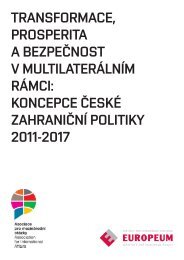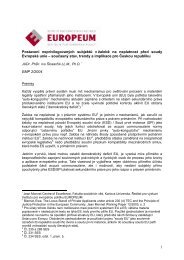eu constitutionalisation - EUROPEUM Institute for European Policy
eu constitutionalisation - EUROPEUM Institute for European Policy
eu constitutionalisation - EUROPEUM Institute for European Policy
You also want an ePaper? Increase the reach of your titles
YUMPU automatically turns print PDFs into web optimized ePapers that Google loves.
Chapter 5: The <strong>European</strong> Constitution and the Re<strong>for</strong>m of External Competencesthat the member states’ decisions on emergency aid infringed its budgetaryprerogatives. With a view to the “complementary” character of this policyand notwithstanding the coordination with Union actions, member statesmay still continue to pursue independent operations.V.5. Chapter V: Restrictive Measures (Art. III-322 CT)The provisions on economic and financial sanctions against third countrieshave all along rendered the inextricable link between CFSP and externalrelations under the current first pillar apparent, both in procedural as wellas in substantive terms. Generally, embargo sanctions are imposed by anauthority against another subject of international law in pursuance of a <strong>for</strong>eignpolicy objective, namely to alter the conduct of the target State.⁸⁴ Art III-322 incorporatescurrent Articles 301 TEC on economic and 60 TEC on financialsanctions and, in terms of procedure, maintains the two-stage approachprovided <strong>for</strong> in Art 310 TEC <strong>for</strong> the adoption of sanctions.⁸⁵ This is particularlynoteworthy with a view to the merger of the pillars. In fact, it providesanother confirmation that, also in a “unified” Constitution, the memberstates’ concerns to hand over sensitive <strong>for</strong>eign policy instruments are successfullyaddressed through the persisting procedural safeguards in theCFSP. For the interruption or reduction of economic or financial relationspursuant to Art. III-322 CT the Council thus needs to adopt a (principally)unanimous <strong>European</strong> decision in the framework of the CFSP. On the basisof such a decision, the Council, acting by qualified majority, would adoptthe necessary <strong>European</strong> regulations or decisions.Evidently, a unanimous Council decision as necessary precondition <strong>for</strong> theadoption of sanctions, though most probably unavoidable from a politicalpoint of view, is a rather challenging requirement in a Union of 25 memberstates. It substantially weakens an otherwise powerful trade and policyinstrument in the hands of the Union. Moreover, the unanimity requirementcomprises another important facet with a view to the competence allocation<strong>for</strong> the adoption of sanctions. Notably, Art. III-322 CT is not assigned84) Compare LUKASCHEK (2002), p. 324 referring to SCHNEIDER (1997) 27f.85) The structure of this provision introduced through the Treaty on <strong>European</strong> Union has been precededby a long standing practice of a combined approach, namely the adoption of sanctions on the basis ofa consensus decision with in the EPC followed by a Community measure based on <strong>for</strong>mer Art 113 TEC; <strong>for</strong>a detailed account on the <strong>European</strong> Union’s legal framework on economic sanctions, compare LUKASCHEK(2002), p.322-354.Chapter 5: The <strong>European</strong> Constitution and the Re<strong>for</strong>m of External Competencesto a specific competence category. On the basis of the general rule in Art.I-14(1) CT, one might there<strong>for</strong>e argue that it figures as a shared competence.This conclusion somewhat contradicts the current perception of Art 301TEC which is that of an exclusive competence⁸⁶ or, alternatively, suggeststhat the scope of the Union’s competence depends on the repartition ofpowers in the field of the respective embargo measures.⁸⁷ Following thelatter approach, <strong>for</strong> example, the “classical” trade sanctions covered by theCommon Commercial <strong>Policy</strong>-competence are exclusive. In contrast, on theassumption that the competence to adopt economic or financial sanctionswas shared in the Constitution, the member states would be principally freeto adopt autonomous sanctions, as long as the Union had not acted in a givencase. This would become problematic in each case where the adoption ofa measure in the Council was blocked <strong>for</strong> the lack of unanimity.With a view to the quest <strong>for</strong> a more coherent and consistent approach inthe field of external relations, this solution seems entirely inappropriate:Particularly with a view to the Union’s comprehensive exclusive powers inthe field of the common commercial policy, it should be out of questionthat the member states adopted autonomous trade sanctions. The moreplausible approach would there<strong>for</strong>e be to not interpret Art. III-322 CT asa genuine empowering provision. Rather, the division of competenceswould depend on the individual case. As long as the Union did not adoptsanctions against a third country, an individual or non-State entity, themember states would be free to take such embargo measures that are not inconflict with any of the Union’s exclusive competences. This might includeflight embargos in the field of transport, visa restrictions, or eventuallythe freezing of accounts in the field of capital and payment. In contrast, itwould prevent the member states from adopting any trade sanctions witha view to the Union’s exclusive competence under Art. III-315 CT. Art. III-322 CT would thus be understood as a horizontal competence provision,conferring power on the Union only in those fields, where the Union’slegislator is internally entitled to act. This approach would also seem in linewith the member states’ interest to retain control on the implementation86) Compare <strong>for</strong> example CREMER (2002), in CALLIES (2002), ad Art 301 para 14 and fn.63.87) Compare <strong>for</strong> example LUKASCHEK (2002), p.345f; this would, <strong>for</strong> example imply that a measure on thebasis of Art 301 TEC, which also encompassed services, would on the basis of Opinion 1/94 only conferconcurrent competence. This view would, however, contradict a systematic interpretation of the Treaty,as Art 60 TEC extends the competence <strong>for</strong> adopting measures under Art 301 TEC to the field of capitaland payment and explicitly <strong>for</strong>esees in its para 2 in exceptional cases, a (concurring) competence of themember states <strong>for</strong> serious political reasons and on grounds of urgency.182183








